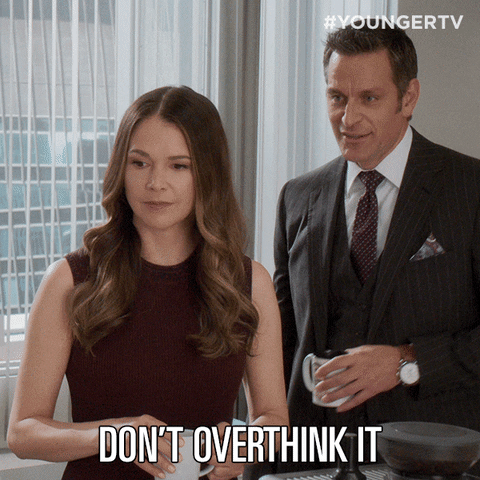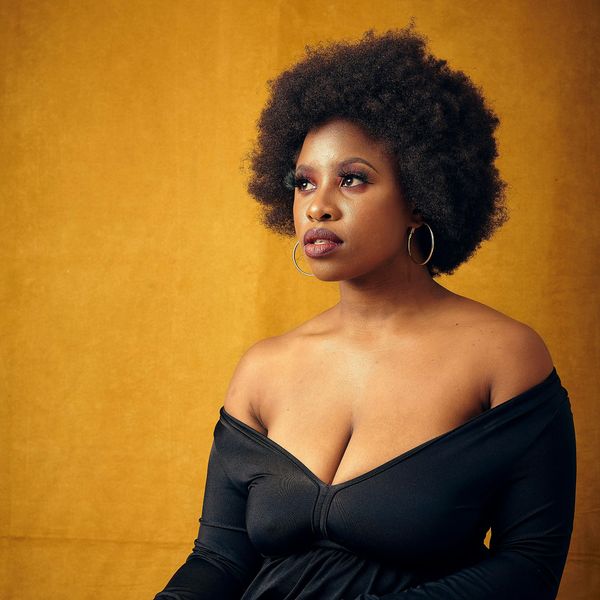
One of my favorite scenes from the (wow) 30-year-old rom-com When Harry Met Sally is when Sally's female BFF goes on and on about how her married lover isn't going to end his marriage. Every time Sally's friend Marie says, "I don't think he's ever going to leave her," and Sally replies with, "Of course he isn't," Marie immediately says, "You're right. I know you're right." And then stays anyway. For years. Fascinatingly enough, it wasn't until Marie let ole' boy go that she ended up with Harry's male BFF. It wasn't until she got out of her own way that what she truly desired manifested in her life—real love from a man who actually wanted to be her husband.
I've been there. Not when it comes to a married man (thank goodness!), but I've definitely remained in a relationship or situationship for way too long (see "What If You Love Someone You Can't Have?"). Hmph. Come to think of it, I've stayed on jobs, in "friendships" and even hung on to philosophies that, as Walt Whitman once put it, insults my own soul. And you know what? What I've come to recognize and accept is life is hard enough without my choosing to put up obstacles in my own life path. Life has enough turns, twists and plot twists that I don't need to be out here standing in my own way.
If that immediately garnered a deep and heartfelt "hallelujah" in your own spirit, but you're not quite sure if you're standing in your own way or not, here are 10 very telling signs that that is exactly what you are doing. The good news is there's no time like the present to…move.
1. You’re a Chronic Overthinker

If you put the word "overthinker" into your favorite search engine, you'll be hard-pressed to find any articles that say that it's a good thing to be. I actually read an article about it that had this title—"Are You an Overthinker? You've Been Poisoned". Personally, I think the biggest issues that come from overthinking is one, you end up creating dramas that don't even exist and two, you end up wasting a colossal amount of time in the process. Since when has being a drama queen (even if it's just in your own head) and not seizing the moments as they come ever worked (well) in anyone's favor?
Overthinking makes life so much harder than it ever has to be. That's why it tops my personal list of the main things that stands in our own way.
2. Self-Love Is Not a Daily Top Priority
There's a woman on YouTube who goes by the name Tonya TKO who calls herself a "self-love specialist". I like that term/title because I think it is something that all of us should aspire to be. And how can you know that you are not only loving yourself but loving yourself well? You pamper yourself. You know your purpose and you thrive in it. You trust yourself. You surround yourself with safe people (if you don't own Safe People: How to Find Relationships That Are Good for You and Avoid Those That Aren't, get it ASAP. You will not regret it!). Your looks are not more important to you than your character. You have no problem removing any person, place, thing or idea that does you harm. You are self-compassionate. You are also self-forgiving. You're humble. You're authentic. You like peace and tranquility. You know how to rest. You live in the moment. You know how to celebrate yourself and others. You are constantly on the quest to learn how to love yourself better.
A lot of people who aren't able to make real progress, whether it be their personal or professional life, oftentimes are stagnant because they may have the right amount of education and resources; however, because they don't truly and fully love themselves, they don't believe in themselves enough to be bold enough to make a real impact. It's a real shame too because self-love is what can help them to do just that.
3. You Spend More Time in Other Folks' Business Than Your Own

There's a verse in the Bible that says, "…that you also aspire to lead a quiet life, to mind your own business, and to work with your own hands, as we commanded you." (I Thessalonians 4:11—NKJV). For the record, "minding your own business" isn't just about limiting the gossip that you read, the advice (especially if it's unsolicited) that you give or taking social media breaks from time to time (because social media will have you out here thinking that you've got the right to be all up in everybody's business!). What I have learned, sometimes the hard way, is it's also about not being more invested in someone's life than they are; especially if it's at the expense of taking care of your own responsibilities, goals and priorities.
As a marriage life coach, there have been so many times when I've found myself being more concerned about the fate of someone's relationship than the couple themselves. It would wreck me with worry and sometimes even fear. Then I had to learn that I am the life "coach", not the actual "players". If a couple truly wanted to "win", they were gonna have to show up. Accepting that brought more peace and balance into my life. Yet, before I did that, I was letting all kinds of things slide in my own world; things that I actually was responsible for.
So yeah, it's a good thing to be kind, caring and involved—to a point. But if you're so focused on someone else's life—online or off—to the point where yours isn't being properly tended to, you are sho 'nuf standing in your own way.
4. Your Boundaries with Toxic People Aren’t Clear
Here's a truth that a lot of us don't want to hear, but if you're sick and tired of standing in your own way, it must be said. Some of us keep getting mistreated by others because we're allowing them to do it. And we're allowing it by not putting any boundaries into place.
It took most of my adult life to realize that boundary-violators couldn't care less about the hurt and harm that they cause. If they did, they wouldn't violate in the first place. And so, the only way to break the cycle is to set some limits and then to be firm and unapologetic about them. Shoot, I'll take it one step further. Not only set them but to provide consequences for when they are violated in the future.
If you don't do that, you'll be standing in your own way, simply because you'll be spending (or is it wasting?) time healing from the damage these kinds of folks have caused rather than thriving as an individual. It's so counterproductive to inflict self-harm by constantly involving yourself with toxic individuals. The empowering thing about what I just said is you have the power to totally change this. Today if you want to.
5. You ALWAYS Put Emotion Over Logic

I must say, off top, that if you read this and immediately got all in your feelings, you are just the one who should finish this point. That said, there is nothing wrong with being emotional. It's a part of what makes us human. At the same time, there is such a thing as being too emotional. What does that look and live like? You criticize yourself a lot. You're hyper-sensitive to any kind of critique or criticism. You have knee-jerk reactions to pretty much any and everything. You overact to stuff. You're consumed with what others think of you. You cry at the drop a hat (and don't even know why you are doing it). You speak before you think. You're super self-conscious. You take everything personally. I could go on, but I think you get the gist. People who are like this tend to drain themselves and others. They also tend to stay stuck in life because unless they "feel" that they should or shouldn't do something, they don't.
Meanwhile, when you operate from a place of logic, you tend to factor in how current choices will affect future outcomes. You don't negate facts just so that you can coddle your feelings. You're attentive to details. You typically get straight to the point. You're big on personal responsibility and accountability. While your feelings may alert you to something, you rely on logic to come to a resolve.
Feelings are a good thing. But logic is what keeps your feelings from causing you to stand in your own way. The balance of the two is always a good thing.
6. You’re Not a “Goal Upgrader”
I believe that there are two kinds of people in this life. There are the ones who want to be a small fish in a big pond and those who want to be a big fish in a little pond. What I mean by that is some people would rather stay right where they are and remain in their comfort zone by only excelling in one thing or area—which is a "big fish"—rather than take risks and travel, meet new people and try new things—they are "small fishes". Or, another way to see it as they are "goal upgraders".
I'm not saying that we should be out here trying to be a jack of all trades. What I am saying, though, is all of us are multi-dimensional. Achieving a goal is cool. Once you have, though, now what? People who are constantly interested in, not being popular but being progressive, who like success but hate stagnation, they are the ones who are constantly knocking down obstacles and making real marks in this world. Nothing can stand in their way, not even themselves, because they are too focused on the next thing to remain "stuck" in the last one. They don't care about being a "big fish" with limitations. Being a "smaller fish" in a pond of numerous possibilities is just fine with them. Achievement means more than ego—and that always takes someone far.
7. You’re Impulsive

Impulsive spending. Talking too much. Being a pop-off. Being indecisive. Regretting a lot of past decisions. Being cyclic when it comes to bad habits and behavior. Doing things in excess. Having a bad (or quick) temper. Constantly making appointments/commitments and breaking them (which isn't good). Starting and stopping things at the drop of a hat. Engaging in lots of casual sex. Jumpin to conclusions a lot. Having a hard time being still and/or alone. "F—ck it" basically being a life motto.
If you really reflect on each of these things, I'm pretty sure you need no explanation from me about how you're standing in your own way by doing any—or all—of them. Let's move on to the next point.
8. You’re Unteachable
I'll tell you what. Social media has brought new meaning to "feeding the monster". It's like, so long as you're telling people how fabulous they are, it's all good. But the moment you provide a different perspective or food for thought, you need to be banished from Facebook, Twitter and Instagram. No wonder there are articles out here like "Social Media Photo Overkill May Boost Narcissism", "Love Facebook? You Might Be an (Adaptive) Narcissist and Not Know It" and "OPINION: The Rise in Narcissism Through Social Media Is Harming Society".
When you have a sense of self-importance and entitlement; when you think that you have the right to share your opinion and perspective but you also feel that others don't (unless they agree with you); when you can't go one day without posting something because you crave the attention; when you only acknowledge praise but don't even take a moment to ponder criticism or pearls of wisdom—this not only defines narcissism, it leans towards arrogance and arrogant people are pretty unteachable.
Unteachable people stand in their own way because if you're not willing to learn, if you think that you're the only one who has something to "teach", you can't grow. If you don't grow, well...
9. You’ve Got an Excuse for Everything

An author and former stockbroker by the name of Jordan Belfort once said, "The only thing standing between you and your goal is the bulls--t story you keep telling yourself as to why you can't achieve it." Yeah, buddy. If you're someone who knows that you'd be a billionaire if you were paid for every excuse that you made, a read that's at least worth skimming is "7 Things You Really Need to Know About Excuses".
As I was checking it out, I thought about how excuses are basically the love language of procrastinators. As long as you're telling yourself or others that you've got a good reason for doing or not doing something (that you know good and darn well that you should be doing or not doing), how can all real progress ever be made? Or, as the author of the article said in two of their points, "The more you make excuses, the easier it is to make even more excuses," and "You can get good at making excuses or you can get good at execution; you can't do both."
That to-do list that you've got close-by? What's it gonna be? Excuses or execution? One keeps you from getting things done. The other…doesn't.
10. You Rarely Leave the Past Where It Is
Mick Jagger once said something about the past that, for the most part, I agree with—"The past is a great place and I don't want to erase it or to regret it, but I don't want to be its prisoner either." As far as what he said about not regretting it, well, I have my own take on that word (you can read more about that here). But as far as the rest of his point? I think the past serves a purpose. If we're paying attention, it can show us what to do and what not to do. At the same time, as I'm currently still healing from some things in my own past, if you're not intentional about processing your past and also moving towards your present, certain things can keep you bitter, unforgiving and super stuck.
It would be a shame if, 20 years from now, you realized that the reason why you didn't make the most of that time wasn't because of anything other than you standing in your own way. So, what are you gonna do? Stand or…move? Please choose wisely.
Want more stories like this? Sign up for our newsletter here and check out the related reads below:
What It Means To Find True Self-Love
How To Handle "Purpose Fatigue"
These Are The Things Self-Aware People Do Daily
6 Signs You Are WAY Too Self-Critical
Feature image by Nappy
- 8 Signs You're Self-Sabotaging Yourself - xoNecole: Women's Interest, Love, Wellness, Beauty ›
- Toxic Friend Habits Self-Sabotage - xoNecole: Women's Interest, Love, Wellness, Beauty ›
- Signs That You're Being Too Stubborn ›
- 5 Signs You're Standing In Your Own Way to Success | Entrepreneur ›
- 8 Signs Getting in the Way of Your Own Happiness - Thrive Global ›
- 5 Signs You're Standing In Your Own Way to Success | Habits ... ›
- 14 Ways You Might Be Standing in Your Own Way to Success ›
- 5 Signs You're Standing In The Way of Your Own Business's Success ›
- 5 Signs You're Standing In Your Own Way to Success ›
- 5 Signs You're Standing In Your Own Way — And How To Get Out of It ›
Your December 2025 Monthly Horoscopes Are All About Surrender & Alignment
December is about letting go. We end the year with the need for more peace, reflection, and rejuvenation, and that is exactly what December is providing for us. The Sun is in Sagittarius, and anything is possible. This is the month to believe in that and to know that the universe is supporting you. With a Supermoon in Gemini as we begin the month as well, we have an opportunity to gain the closure we have been looking for this year and to wrap up old projects, ideas, and communication breakthroughs.
This is the month to make your peace the priority and let go of trying to control the way the tides are turning. Trust in your new beginning, and give yourself time to prepare for it this month.
A big part of the clarity that is coming through this month is due to Neptune going direct in Pisces on December 10, after being retrograde here since July. With Neptune now direct, we are able to see our inspiration and creativity a little more clearly, providing the perfect energy for dreams and manifestation to be built upon. The smoke is clearing, and it’s up to you to decide what you want to do with this newfound clarity that this transit is bringing. Mercury also moves back into Sagittarius on December 11, which is great for communication and clarity, and the adventures you were trying to see through at the beginning of November come around for you again with greater purpose and support.
On December 15, Mars enters Capricorn until the end of January 2026, and this is the extra push we need to make important changes and to be on the path towards greater abundance, stability, and prosperity. Mars in Capricorn takes care of business, and we have extra energy at our disposal during this time to do so. This transit is an ideal time to focus on your career or financial goals for next year and to start putting some of these plans into motion now. A few days later, we have the New Moon of the month, which will be in Sagittarius on December 19, and this is the perfect New Moon to manifest.
The energy is high, magic is in the air, and it’s all about moving forward with the new beginnings that are inspiring you and bringing you joy to think about right now.
Capricorn Season officially begins on December 21, and this earth sign energy is how we heal, gain closure, and build new foundations in our world. With Venus also moving into a Capricorn a few days later, there is something about peace, prosperity, and security that we are gaining in life and in love as we close out the year, and this is what we need right now. This month is about reflecting on what was, letting go of old hurt, and renewing. December is an ending and a new beginning in one, and there is magic in this space to be created.
Read for your sun and rising sign below to see what December 2025 has in store for you.
 AriesKyra Jay for xoNecole
AriesKyra Jay for xoNecoleARIES
December is a full-circle moment for you, Aries. You are seeing the gifts in your world and have a lot of gratitude for the way things have come about for you as of late. There are culminations in your world that are providing you with more abundance, stability, and community, and you are exactly where you are meant to be this month. With the Sun in a fellow fire sign and in your 9th house of travel for most of the month, December is a good time to get out of your comfort zone, explore the world around you, and get your body moving.
Mars, your ruling planet, also makes a change and moves into Capricorn on December 15, which will fuel your inspiration and power in your career space. You are making a lot of professional progress as we close out the year; however, make sure to be more mindful of your competitive drive right now. The New Moon on December 19 is the perfect opportunity for you to create some new plans and goals when it comes to traveling, education, and where you want to gain some new inspiration in your world. Overall, this is a month of things coming together for you serendipitously.
 TaurusKyra Jay for xoNecole
TaurusKyra Jay for xoNecoleTAURUS
December is about trusting your intuition, Taurus. You have a lot on your mind this month, and it’s best to delegate, communicate, and allow yourself some relief by opening up to someone and not feeling like you have to hold everything in. As we begin the month, we have a Supermoon in Gemini happening in your house of income, and the plans and projects you have been building here come to fruition for you now. This is the time to gain clarity on your financial world and to take a look at what spending habits you want to let go of here as well.
With Venus in your 8th house of shared resources for most of the month, you are doing a cleanse on your commitments, partnerships, and business ventures. You are taking a look at what you want to dedicate yourself to in the future, and what commitments you may need to let go of now in order to be in the space you truly want to be, both financially and within some of your relationship dynamics. Before we end the month, we have a New Moon in this same area of your chart, and it’s time to look at the opportunities that are presenting themselves and to trust your internal guidance system to lead you forward.
 GeminiKyra Jay for xoNecole
GeminiKyra Jay for xoNecoleGEMINI
You are moving forward fearlessly this month, Gemini. December is your month of love, passion, and dignity, and you are owning the light that you shine. We begin the month with the last Supermoon of the year, happening in your sign, and you are stepping up to the plate. You are showing up, owning how much you have grown this year, and allowing yourself to heal while also acknowledging that you have done your best and you deserve to have fun in the midst of the changes you are creating.
Mercury, your ruling planet, is officially out of retrograde, and you can use this energy to the fullest potential now. With Mercury in your 7th house of love, it’s time to speak from the heart and to talk about the things that matter and that are inspiring you right now to your loved ones. You never know what kind of epiphanies you may have when you open up the conversation to others. Before the month ends, you have a New Moon in this same love area of your chart, and this New Moon is all about manifesting romance, commitment, and abundance in your world.
 CancerKyra Jay for xoNecole
CancerKyra Jay for xoNecoleCANCER
December is an opening for more love, more joy, and more freedom in your life, Cancer. You have come to a place where you hold so much gratitude in your heart for where you are today and where your heart is shining, and things come together for you with more ease right now. With the Sun in your 6th house of health, work, and daily routines for most of the month, you are getting your ducks in a row while also putting more energy and effort into taking care of yourself, your priorities, and your well-being. This month surprises you in many ways, and it’s because you are showing up.
Mars and Venus both move into your house of love, relationships, marriage, and abundance this month, and you are making strides in your love life. You have both of these opposing forces on your side and are being recognized for the love you are while also receiving the love you want. This month, overall, is about focusing more on the positives in your world and letting your heart have its joy. Before December comes to an end, there is a New Moon in Sagittarius, and this is the perfect opportunity to create the plans you want to see through next year, especially when it comes to your work life, colleagues, business ventures, and health.
 LeoKyra Jay for xoNecole
LeoKyra Jay for xoNecoleLEO
The scales of karma are balancing, and they are balancing in your favor this month, Leo. December is your month of truth, and of seeing it clearly in your world. The Sun is in your house of romance, pleasure, and happiness for most of the month, and it’s time to relax, be in the present moment, and allow what is meant to be, to be. With a Supermoon in your 11th house of manifestation as December begins, this is a powerful month for seeing your dreams come to fruition, and for feeling like the intentions you have set this year are finally here for you now.
Mars also moves into your 6th house mid-month, and this is the perfect energy to have to move into the new year. You have extra energy at your disposal right now and are feeling fearless with what is possible for you and your daily routine. Before the month ends, we also have a New Moon in a fellow fire sign, Sagittarius, and this is a breakthrough moment for you and your heart. December, overall, wants to show you how loved and supported you are and will be doing so in magical, unexpected, and concrete ways.
 VirgoKyra Jay for xoNecole
VirgoKyra Jay for xoNecoleVIRGO
December is a month of victory, Virgo. You are showing up and experiencing some new successes in your world that move you forward on your path in life. With a Supermoon in your 10th house of career as we begin the month, the effort and intentions you have made this year come into full bloom, and you are being recognized for who you are and the good work you have done. This month is all about showing up and allowing yourself to be seen and loved, knowing that you deserve the support and opportunities you are receiving.
Mars moves into Capricorn on December 15, which brings the passion and excitement into your love life, hobbies, and little pleasures in life that light you up. You want to have fun this month and are going to be walking into the new year with this fearless, happy, and spontaneous energy within you. Before the month ends, Venus also enters Capricorn, and in this same area of your chart, you have a lot to look forward to and believe in right now. Overall, December wants you to be happy and will be doing everything possible to make that happen for you. This is your month to shine, Virgo.
 LibraKyra Jay for xoNecole
LibraKyra Jay for xoNecoleLIBRA
December is a month of opportunity for you, Libra. New doors open, and you are financially making breakthroughs this month because of it. December begins with a Supermoon in your 9th house, and you are getting a clearer view of where you have been making strides in your life and how it has all brought you here to this present moment of freedom. This month is showing you what happens when you are fearless with your purpose and when you believe in yourself and what you are worthy of.
Moving further into December, Mars moves into your 4th house of home and family mid-month, and you are closing out the year in your safe spaces. You are spending more time with your loved ones and taking the time to quiet your mind and listen to what your heart has been telling you. Before the month ends, we have a New Moon in Sagittarius, happening in an area of your life that deals with communication. This is a great time for getting the answers you have been looking for and for feeling more clear-headed and confident about the decisions you are making as you move into the new year.
 ScorpioKyra Jay for xoNecole
ScorpioKyra Jay for xoNecoleSCORPIO
Patience is a virtue this month, Scorpio. December is all about remaining patient and vigilant with what you are creating in your world, and knowing that the universe has your back. It’s time to be reminded of the power of hope, and this month is an opening to greater clarity in your life. There is a lot of energy in your financial zones right now, and this is providing you with new opportunities and new insight; however, the speed at which things come about for you may feel daunting. Keep your head up and eyes focused on what you want and know that you are more than worthy of receiving it.
With Mercury in your 2nd house of income this month, December is a good time to plant new seeds and to think about where you want to be financially a month from now or even a year. This month is asking you to think bigger and to think more long-term so that you can set the appropriate plans into motion now. We also have a New Moon in your house of income before the month ends, and this is when you will see more of your dreams come to fruition in this area of your life, and have more opportunities to build. Overall, December will be teaching you a lot, Scorpio.
 SagittariusKyra Jay for xoNecole
SagittariusKyra Jay for xoNecoleSAGITTARIUS
Sagittarius Season is here, and there is a lot in store for you this month, Sag. December is all about what you are dedicating yourself to. It’s about setting your intentions and putting the work in to back up your dreams, and about getting things in order so that when the new beginnings come, you are ready for them. The Sun and Venus are in your sign for most of this month, and there are a lot of eyes on you right now. You have the potential to create a new beginning for yourself, and it’s time to invest in yourself, your love life, and your dreams.
Mercury moves into Sagittarius on December 11, and this is giving you another opportunity to see through some of the plans that you had initiated in November. Mercury was retrograde in your sign last month, and there may have been some disruptions to your vision and plans for the future, and now this energy is turning around for you. Before the month ends, we also have a New Moon in Sagittarius, and you are walking through new doors fearlessly. You are catching others by surprise by your growth this month, and you are thinking a lot about your purpose, future, and plans for the new year.
 CapricornKyra Jay for xoNecole
CapricornKyra Jay for xoNecoleCAPRICORN
December is all about the vision, Capricorn. You are moving through a lot of changes and transformations this month, yet they are giving you a chance at a new beginning in the process. You are focused more on the future and what goals you want to manifest for yourself right now, and are ready to let go of what hasn’t been working for you. With the Sun in your 12th house of closure for most of December, this is your time for healing, but remember, healing doesn’t have to be isolating or boring; you can thrive while you renew, and you are this month.
Mid-month, the excitement picks up for you, and you are feeling more energized than you have in a while. Mars moves into Capricorn until the end of January 2026, and you are being proactive with your goals, intentions, and passions. You are a force to be reckoned with this month, and you are making things happen for yourself with confidence. Capricorn Season officially begins on December 21 this year, and this is definitely speeding up your healing process. You are breaking free from what was, and with Venus also moving into Capricorn before the month ends, you are leaving this year in high spirits and with love opening a new door for you.
 AquariusKyra Jay for xoNecole
AquariusKyra Jay for xoNecoleAQUARIUS
December is all about community, creativity, and manifestation, Aquarius. This is the month to work together with others to help bring your dreams to life. You are in a space of inspiration, empowerment, and beauty, and are creating more of this energy around you and in your world. Look out for what support comes your way this month and know that you don’t have to do everything alone to succeed. With the Sun in your 11th house of manifestation and friendship, your intentions are coming to fruition, and it’s time to celebrate with the people you love and to own how far you have come this year.
On December 19, we have a New Moon in Sagittarius, lighting up your life in all of the best ways possible. This is your New Moon of freedom, victory, and magic, and you are seeing new beginnings appear that you were once just hoping for. Before the month comes to an end, Venus moves into your 12th house of closure, and after an active and successful month, you are ready to relax, heal, and give your heart some of the attention it has been asking for. You are moving into the new year with the need to release and renew what hasn’t been working in your relationships, and you are finally ready to.
 PiscesKyra Jay for xoNecole
PiscesKyra Jay for xoNecolePISCES
December is a big month for you, Pisces. You are making some huge accomplishments this month, and are feeling like everything you have been through this year has been worth it for these moments that are coming to fruition for you now. The Sun is in your 10th house of career and reputation for most of the month, and this is where a lot of your focus is right now. You are claiming your successes and putting yourself out there in ways that not only serve you, but that inspire others as well.
Neptune officially goes direct on December 10, after being retrograde in your sign since July, and you are finally seeing things a little more clearly. You are feeling renewed inspiration and passion in your life, and your intuition is your strongest asset right now. Before December comes to an end, we also have a New Moon in your 10th house of career, and what happens now not only changes things for you in the present, but it also opens new doors and what is possible for you in the new year as well. Overall, you are on top of your game this month and are owning the joy and empowerment you feel.
Featured image by Kyra Jay for xoNecole
Why The Cayman Islands Is The Ideal Soft-Life Island-Hopping Destination
It's always a pleasure to add a new stamp to the passport, especially when it's an opportunity to visit a country you've never been to. When invited to explore the Cayman Islands, I was very familiar with Grand Cayman—the largest among the three islands, known for its stunning clear-blue beaches, and modern city comforts—but I seriously slept on Cayman Brac.
On a six-day trip, I knew Grand Cayman would be that girl, but the smaller sister island Cayman Brac? She’s the captivating, low-key spot that is a whole soft-life fantasy.
This trip was my first time in the destination, via the Cayman Islands Department of Tourism (@visitcaymanislands) and it had all the luxe chill and exploration that makes for great memories that will prompt anybody to want to return again and again. Plus, it was the tail end of rainy season, which is basically my jam because off-peak travel makes me feel like a VIP. I get the beauty, the beaches, the food, the people—without the crowds and noise.
Let’s get into how you can pack your Cayman Islands itinerary with cultural exploration, elevated cuisine, deep restoration, and an island-hopping adventure along the way.
GRAND CAYMAN
Grand Cayman hits you with that effortless island confidence from the moment you land. It’s the largest of the Cayman Islands, known for crystal-clear Caribbean waters and a culture that blends British influence with laid-back island charm.
Visitors pull up for Seven Mile Beach, stingray encounters, fresh seafood, and those luxe resorts and villas that make unplugging way too easy.
Where To Stay

Courtesy/Grand Cayman Marriott Resort
Grand Cayman Marriott Resort: This property offers ocean views, polished comfort, with easy access to everything near Seven Mile Beach. (Marriott stays are often a go-to for me when I’m in the mood for a resort stay where the standards are consistent no matter the destination).
The spacious rooms, warm staff, and a pool area perfect for quick resets between adventures were a hit for me. Despite the patchy rain, lounging by the pool felt like a reset button.
I popped into the gift shop and found pieces from Isy B, the Cayman-based brand created by Isy Obi, a Black woman who pivoted from finance to fashion. The designs are bold, colorful, full of vibes I love to reference when returning home.
Botanica Luxury Cottages: The cluster boutique cottages blend island-chic décor with modern touches. My cabin had vaulted ceilings, washer and dryer, roomy showers, a cozy lounge area, and a private outdoor nook with stylish umbrellas and seating perfect for reading, sunbathing, or unwinding. A pool is just a short walk away on the property and Seven Mile Beach was just a quick drive. I took a two-mile stroll along the shoreline where families, chilled-out tourists, and sleek beach clubs lended to a balanced and laid-back but lively environment.

Courtesy/Botanica Luxury Cottages
Where To Eat
Pom Pom: This breezy rooftop lounge serving curated cocktails with a relaxed, stylish vibe and mellow music was the perfect evening welcome to the island. And the sunsets are divine.
Avecita Chef’s Table: It’s an amazing multi-course dining experience where chefs craft global flavor fusions right in front of you. Expect bubbles, bold tastes, and an ambiance that feels refined without being pretentious. This is one experience I definitely plan to fly back to Cayman for in the new year.
Pepper’s Bar & Grill: Conveniently located just across the street from the resort, it’s a local casual spot with live music and unique takes on Caribbean meal staples. The Cayman-style jerk pork was a favorite.
Ristorante Pappagallo: Set on a 14-acre bird sanctuary overlooking a saltwater lagoon, this brunch delivered everything from sushi to risotto to curry goat to barbacoa tacos. The white tablecloth elegance paired with homestyle warmth and peaceful water views made the whole experience feel elevated yet comforting.Bacaro
Bacaro: This is where we had our farewell dinner, enjoying their Venetian-inspired small plates and curated cocktails. If you want a final night with your partner or even your best girl group, this is the spot.
Things To Do:

Courtesy/Island Soul
Floating Sound Bath with Island Soul: The floating meditation was calming, grounding, and deeply restorative. We had the sky and breeze as a backdrop and listened to music, prompts and chimes that allowed us to simply float and be.
Anchor & Den Cocktail Class at the Grand Cayman Marriott Resort: I thoroughly enjoyed this lively, hands-on cocktail-making session which would be fun for couples, friends, or anyone wanting a playful evening activity without leaving the property.
The Grove: This is a foodie and art-lover's delight with its dining and culture scene that features spots like Island Naturals, a chill café with plant-forward dishes—where the mushroom tacos were everything, and the tuna poke nachos are a must—and upscale spots like Mykonos Steak Club. After eating, stop by Carlos Garcia’s gallery, a working studio and public exhibition space that supports a collective of local and international artists, and regularly hosts events, pop-ups, and live painting.
Pirates Week Festival: This was a welcome surprise addition to our itinerary, and it's an event held in November across the Cayman Islands, with the major events happening in the heart of Grand Cayman's George Town. During the finale, I was out there jumping and whining to Nessa Preppy and Faith Callender, rum in hand, surrounded by locals and pure island joy. As a woman who loves soca, that moment lit me up. It was the perfect last hurrah with a slice of home, culture, and celebration.
Bonny Moon Beach Club: It’s a Tik Tok-famous stylish beachfront lounge experience that, for me, actually matched the good reviews. The octopus ceviche and everything from the woodfired portion of the menu were a hit and the DJ added the right amount of energy. We ate just steps from the ocean. It's swanky, atmospheric, and ideal for date night, girls’ trips, or baecations.
CAYMAN BRAC
Known for dramatic limestone cliffs, caves, and some of the best diving in the Caribbean, the vibe in Cayman Brac is slower, more local, and perfect if you want nature, real island culture, and adventure without the crowds. I took a quick Cayman Airways flight from Grand Cayman and spent two days there.
The visit was honestly one of the most peaceful, soul-nourishing parts of my trip. The moment I landed, the island reeled me in—raw, mysterious, almost cinematic in its quiet beauty. There’s a softness that feels like an alluring secret.
Where to Stay

Courtesy/Le Soleil d'Or
Le Soleil d’Or: This is a farm-focused boutique haven with luxury villas, a restaurant, a pool, and its own beach club. Our villa was huge, complete with a kitchen, living room, laundry space, game room, and the modern luxury master suite of my dreams.
The bathroom had a soaking tub that fit my 5’7"-plus frame, a large shower, and his-and-her sinks. The bedroom had tons of storage, a large comfy bed, and a mini fridge, plus a TV lounge and veranda opening to the pool. Honestly, my suite could’ve been a full studio apartment back home—I was blown away.
The farm-to-table meals, which I could enjoy at the restaurant just steps away from my suite, were rich, fresh, and soulful. My morning walks on the property were serene, wrapped in nothing but nature and quiet.
If you want an escape from the tourist and business buzz of Grand Cayman, this is the perfect hideaway for a baecation, girls trip, or solo venture.

Courtesy/Le Soleil D'Or
Things To Do & Good Eats
Rock Iguana Yoga: This soothing yoga and therapeutic art experience was set in lush island terrain and was a grounding, earthy immersion that eased my back pain from stress, and was a great quiet time to reflect and release. The instructor was patient, graceful, and welcoming.
Le Soleil D’Or Beach Club: It's a chill open beachfront that offers a peaceful, quiet experience in the off season. Think serene solitude, gentle waves, and open space to unwind—far from the typical beach club scene with loud DJs, pumping music, and high-energy crowds.
Star Island Restaurant: This restaurant reminded me of my favorite local spots in Jamaica where you can get food with spices and tastes like your Caribbean grandma or auntie made the meals with love. The menu includes Caribbean dishes like jerk chicken and Cayman's national dish, stewed turtle.
I’ve been to several islands across the Caribbean—with my tried-and-true all-time favorite being Jamaica—and I must say, if you want that soft-life island-hopping luxury adventure paired with opportunities to connect with a rich arts, music, and culinary scene, a trip to the Cayman Islands is exactly that.
Featured image via Shutterstock









